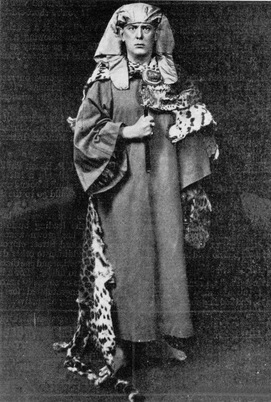
R
E
V N
E
X
T
Drop by the “Anonymous Society for Magick” at Blindspot Gallery in Hong Kong. The group show departs from 19th century occultist Aleister Crowley’s notion of “magick” as the “science of understanding oneself and one’s conditions.” More specifically, Crowley’s mystical belief system, Thelema, is centered on manifesting change in accordance with one’s will. Penned during his honeymoon in Cairo, Crowley’s treatise The Book of the Law (1904) heralds the “Aeon of Horus” (ancient Egyptian god of the sky), which in Thelemite cosmogony succeeds the Aeons of Osiris (Horus’s father; god of the underworld) and Isis (Horus’s mother; goddess of life, healing, and magic).
Aleister Crowley’s fascination with Egyptian iconography reflected the West’s longstanding Orientalist obsession with the ancient civilization. Egyptomania extended to 20th century mainstream cinema with horror flicks such as The Mummy (1932), in which—spoiler alert—the heroine is rescued from the titular monster by the goddess Isis. The reanimated corpse was played by none other than Boris Karloff, who was cast following his star turn as Frankenstein’s monster the year before.
Boris Karloff lived for a time in Whitley Heights, Hollywood, a glamorous locale popular among early 20th century film stars. A famous resident was silent actor Rudolph Valentino (1895–1926), whose sudden death at the age of 31 was rumored to have been caused by a cursed tiger’s eye ring he had purchased from a San Francisco jeweler in 1920.
A cursed ring is at the center of one story in the 1963 Italian horror anthology film Black Sabbath (introduced by Boris Karloff, no less!). In the segment, a nurse pockets a ring from a corpse: bad idea.
The heavy metal band Black Sabbath, which formed in 1968, was known to use a dissonant musical tritone called the Devil’s interval. This can be heard in their song “Black Sabbath” from their self-titled debut album, which features a cover of a witchlike woman in a black cloak. The image was shot on Kodak infrared aerochrome film by English photographer Keith McMillan (credited only as “Keef” in the original liner notes), who told Rolling Stone 50 years after the album’s release that he did “a little bit of tweaking in the chemistry to get that slightly dark, surrealistic, evil kind of feeling.”
In European folklore, naturally occurring circles of mushrooms were often attributed to the dancing of witches or sprites; the mycological formations are still commonly known as witches’ or fairy rings. Artist Trevor Yeung conjures an enchanting configuration of fungi in his lamp Night Mushroom Colon (Five) (2016), which currently illuminates the “Anonymous Society for Magick.”
“Free Association” is a glimpse into the chaotic mind of an ArtAsiaPacific editor, featuring a healthy sprinkling of fun facts and pop culture arcana.
To read more of ArtAsiaPacific’s articles, visit our Digital Library.














